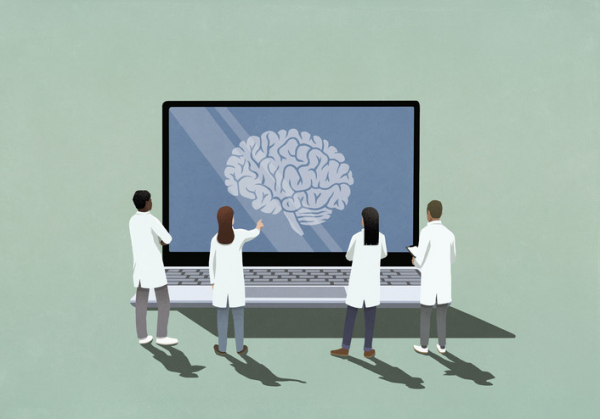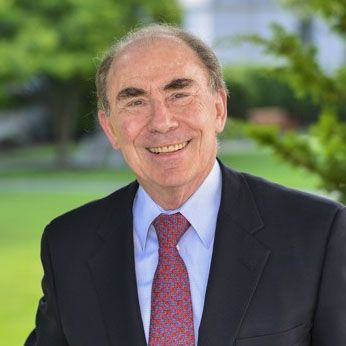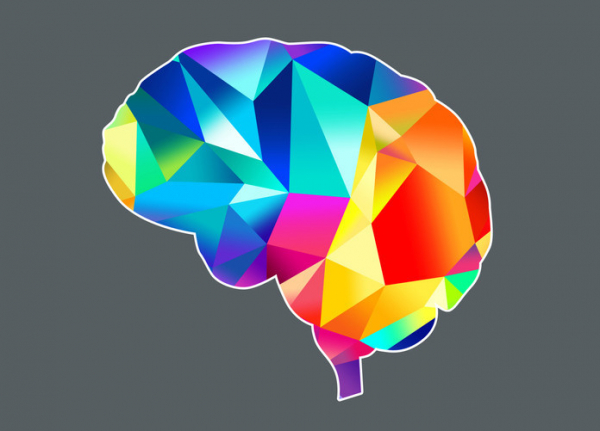
Is chronic fatigue syndrome all in your brain?

Chronic fatigue syndrome (CFS) –– or myalgic encephalomyelitis/chronic fatigue syndrome (ME/CFS), to be specific –– is an illness defined by a group of symptoms. Yet medical science always seeks objective measures that go beyond the symptoms people report.
A new study from the National Institutes of Health (NIH) has performed more diverse and extensive biological measurements of people experiencing CFS than any previous research. Using immune testing, brain scans, and other tools, the researchers looked for abnormalities that might drive health complaints like crushing fatigue and brain fog. Let’s dig into what they found and what it means.
What was already known about chronic fatigue syndrome?
In people with chronic fatigue syndrome, there are underlying abnormalities in many parts of the body: The brain. The immune system. The way the body generates energy. Blood vessels. Even in the microbiome, the bacteria that live in the gut. These abnormalities have been reported in thousands of published studies over the past 40 years.
Who participated in the NIH study?
Published in February in Nature Communications, this small NIH study compared people who developed chronic fatigue syndrome after having some kind of infection with a healthy control group.
Those with CFS had been perfectly healthy before coming down with what seemed like just a simple “flu”: sore throat, coughing, aching muscles, and poor energy. However, unlike their experiences with past flulike illnesses, they did not recover. For years, they were left with debilitating fatigue, difficulty thinking, a flare-up of symptoms after exerting themselves physically or mentally, and other symptoms. Some were so debilitated that they were bedridden or homebound.
All the participants spent a week at the NIH, located outside of Washington, DC. Each day they received different tests. The extensive testing is the great strength of this latest study.
What are three important findings from the study?
The study had three key findings, including one important new discovery.
First, as was true in many previous studies, the NIH team found evidence of chronic activation of the immune system. It seemed as if the immune system was engaged in a long war against a foreign microbe — a war it could not completely win and therefore had to keep fighting.
Second, the study found that a part of the brain known to be important in perceiving fatigue and encouraging effort — the right temporal-parietal area — was not functioning normally. Normally, when healthy people are asked to exert themselves physically or mentally, that area of the brain lights up during an MRI. However, in the people with CFS it lit up only dimly when they were asked to exert themselves.
While earlier research had identified many other brain abnormalities, this one was new. And this particular change makes it more difficult for people with CFS to exert themselves physically or mentally, the team concluded. It makes any effort like trying to swim against a current.
Third, in the spinal fluid, levels of various brain chemicals called neurotransmitters and markers of inflammation differed in people with CFS compared with the healthy comparison group. The spinal fluid surrounds the brain and reflects the chemistry of the brain.
What else did study show?
There are some other interesting findings in this study. The team found significant differences in many biological measurements between men and women with chronic fatigue syndrome. This surely will lead to larger studies to verify these gender-based differences, and to determine what causes them.
There was no difference between people with CFS and the healthy comparison group in the frequency of psychiatric disorders — currently, or in the past. That is, the symptoms of the illness could not be attributed to psychological causes.
Is chronic fatigue syndrome all in the brain?
The NIH team concluded that chronic fatigue syndrome is primarily a disorder of the brain, perhaps brought on by chronic immune activation and changes in the gut microbiome. This is consistent with the results of many previous studies.
The growing recognition of abnormalities involving the brain, chronic activation (and exhaustion) of the immune system, and of alterations in the gut microbiome are transforming our conception of CFS –– at least when caused by a virus. And this could help inform potential treatments.
For example, the NIH team found that some immune system cells are exhausted by their chronic state of activation. Exhausted cells don’t do as good a job at eliminating infections. The NIH team suggests that a class of drugs called immune checkpoint inhibitors may help strengthen the exhausted cells.
What are the limitations of the study?
The number of people who were studied was small: 17 people with ME/CFS and 21 healthy people of the same age and sex, who served as a comparison group. Unfortunately, the study had to be stopped before it had enrolled more people, due to the COVID-19 pandemic.
That means that the study did not have a great deal of statistical power and could have failed to detect some abnormalities. That is the weakness of the study.
The bottom line
This latest study from the NIH joins thousands of previously published scientific studies over the past 40 years. Like previous research, it also finds that people with ME/CFS have measurable abnormalities of the brain, the immune system, energy metabolism, the blood vessels, and bacteria that live in the gut.
What causes all of these different abnormalities? Do they reinforce each other, producing spiraling cycles that lead to chronic illness? How do they lead to the debilitating symptoms of the illness? We don’t yet know. What we do know is that people are suffering and that this illness is afflicting millions of Americans. The only sure way to a cure is studies like this one that identify what is going wrong in the body. Targeting those changes can point the way to effective treatments.
About the Author

Anthony L. Komaroff, MD, Editor in Chief, Harvard Health Letter
Dr. Anthony L. Komaroff is the Steven P. Simcox/Patrick A. Clifford/James H. Higby Professor of Medicine at Harvard Medical School, senior physician at Brigham and Women’s Hospital in Boston, and editor in chief of the Harvard … See Full Bio View all posts by Anthony L. Komaroff, MD

How well do you score on brain health?

Need another jolt of motivation to shore up a resolution to shed weight, sleep more soundly, boost nutrition or exercise levels, or cut back on alcohol? Then you'll be pleased to learn that any (and all) of these efforts can also add up to better brain health.
An international study led by researchers at the McCance Center for Brain Health at Massachusetts General Hospital devised and validated a Brain Care Score (BCS) card that makes it easy to total up what you're doing well and where you might do better. The prize is a healthier brain — specifically a lower risk for dementia and strokes.
Designed to predict how current habits might impact future brain health, the user-friendly scorecard is apparently the first of its kind, says Dr. Andrew Budson, a lecturer in neurology at Harvard Medical School.
"It's a real service that the researchers have developed a scale like this and completed the first study to determine if scoring worse on this scale raises your risk for dementia and stroke," says Dr. Budson, who wasn't involved in the analysis. "On one hand, no one's done something quite like this before. On the other, however, it's really wrapping together health factors everyone has known for a number of years in new packaging."
What's included on the scorecard?
Called the McCance Brain Care Score, the card tallies points from 12 physical, lifestyle, and social-emotional domains.
Physical components relate to
- blood pressure
- blood sugar
- cholesterol
- body mass index (BMI).
Lifestyle components include
- nutrition
- alcohol intake
- smoking
- aerobic activities
- sleep.
Social-emotional factors inquire about
- stress management
- social relationships
- meaning in life.
Each response is given a score of 0, 1, or 2, with the highest possible score totaling 21. Higher scores suggest better brain care.
"All these physical and lifestyle factors can contribute to the risk of dementia to some extent through strokes," Dr. Budson says. "Those that aren't a risk through strokes are usually related to the fact that a healthy brain is a brain that's using all of its parts. Engaging in healthy relationships and meaningful activities helps us maintain good brain structure and function."
What did the analysis involve?
The study was published online in Frontiers of Neurology in December 2023. It involved nearly 399,000 adults ages 40 through 69 (average age 57; 54% women) who contributed personal health information to the UK Biobank.
During an average follow-up period of 12.5 years, participants recorded 5,354 new cases of dementia and 7,259 strokes. Researchers found that participants with higher Brain Care Scores at the study's start had lower risks of developing dementia or strokes over time.
These threats to health and independence take a stunning — and growing — toll on people in the US. Dementia affects one in seven Americans, a rate expected to triple by 2050. Meanwhile, more than 795,000 people in the United States suffer a stroke each year, according to the CDC.
What did the study find?
Each five-point step higher in the BCS rating assigned when the study began was linked to significantly lower risks of dementia and stroke, with those odds varying by age group:
- Participants younger than 50 at the study's start were 59% less likely to develop dementia and 48% less likely to have a stroke with each five-point higher score on BCS.
- Participants 50 through 59 at the study's start were 32% less likely to develop dementia and 52% less likely to have a stroke with each five-point higher score on BCS.
But those brain disease benefits appeared to diminish for those older than 59 at the study's start. This group experienced only 8% lower odds of dementia and a 33% lower risk of stroke with each five-point higher score on BCS. Study authors theorized that some of these participants may have already been experiencing early dementia, which is difficult to detect until it progresses.
"I feel very comfortable that the study's conclusions are entirely correct, because all the factors that go into its BCS are well-known things people can do to reduce their risk of stroke and dementia," Dr. Budson says.
What are the study's limitations?
However, Dr. Budson notes that the study did have a couple of limitations,. The UK Biobank fell just short of collecting all the components of the BCS in its dataset, lacking meaning-of-life questions. So its scores ranged from 0 to 19, not up to 21. "It's a practical limitation, but it should be acknowledged that so far, there have been no studies to validate the actual 21-point scale they're recommending we use," he says.
The analysis also evaluated participants' scores at just one point in time instead of several, Dr. Budson says. Future research should determine whether people can lower their stroke and dementia risk by improving their BCS over time with behavior and lifestyle changes.
How can you play this game at home?
While better brain health may be the clear prize of a higher score, it's far from the only benefit. That's because improving any health component of the BCS also benefits our overall well-being.
"By improving these factors, not only will people help their brain, but they'll also help their heart and reduce their risk of cancer," Dr. Budson adds. "These factors will absolutely also improve your psychological health, which is certainly an important part of brain health."
The scale's simple breakdown of health factors also makes it easy to focus on tweaking one or two without getting overwhelmed.
"Let's say someone's nutrition isn't perfect — and they know it — but they're not willing to change their diet. Fine. They can then decide to do more aerobic exercise, for example, or to stop drinking, or to get the sleep their body needs," he says.
What one change could put you on a path to better brain health?
If he had to choose just one factor to improve brain health, Dr. Budson would focus on meaning of life, "which means you generally feel your life has meaning or purpose," he says. To do that, he suggests giving deep, quiet thought to what you wish your life's purpose to be, whether you expect to live a long time or just a few years.
"Once you have a purpose, then you have a reason to follow through with assessing all the other items on the BCS scale and seeing what you can do so you'll be around longer, and be competent and capable longer, to help fulfill the meaning and purpose of your life," he says.
About the Author

Maureen Salamon, Executive Editor, Harvard Women's Health Watch
Maureen Salamon is executive editor of Harvard Women’s Health Watch. She began her career as a newspaper reporter and later covered health and medicine for a wide variety of websites, magazines, and hospitals. Her work has … See Full Bio View all posts by Maureen Salamon
About the Reviewer

Howard E. LeWine, MD, Chief Medical Editor, Harvard Health Publishing
Dr. Howard LeWine is a practicing internist at Brigham and Women’s Hospital in Boston, Chief Medical Editor at Harvard Health Publishing, and editor in chief of Harvard Men’s Health Watch. See Full Bio View all posts by Howard E. LeWine, MD